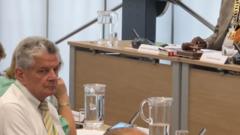Is Man-Made Global Warming Really a Hoax? Councillor Sparks Controversy!

Understanding the Controversy Surrounding Climate Change Denial in Local Politics
In recent years, the debate surrounding climate change has intensified, leading to significant discussions at various levels of governance. A striking example emerged from Nottinghamshire County Council, where senior Reform UK councillor Bert Bingham claimed that man-made global warming is a "hoax." This statement ignited a firestorm of criticism, raising fundamental questions about the intersection of politics, science, and public opinion on climate issues. In this article, we will delve into the implications of such claims, the scientific consensus on climate change, and the broader societal impact of climate denial in political discourse.
The Context of Bingham's Claims
During a public meeting, Bingham expressed skepticism about climate change, asserting that data regarding global warming is "manipulated" and that the public has been "brainwashed" through media narratives. His comments were made in response to a motion brought forth by Labour councillors advocating for Nottinghamshire to commit to becoming carbon neutral by 2030. Bingham's statements not only reflect a personal belief but also highlight a growing trend among certain political factions to challenge established scientific consensus.
What Does Bingham Believe?
- Bingham has been involved in sustainability projects for over 25 years, yet he claims the evidence for man-made climate change is exaggerated.
- He suggests that following the money reveals the truth behind climate science, implying a monetary motivation behind climate change advocacy.
- Despite opposing net zero targets, Bingham claims to support various environmental initiatives, indicating a complex position within the political landscape.
The Scientific Consensus on Climate Change
Contrary to Bingham's assertions, there is overwhelming scientific consensus on climate change and its anthropogenic causes. Numerous studies and reports from reputable organizations, including the Intergovernmental Panel on Climate Change (IPCC), clearly state that human activities, primarily the emission of greenhouse gases, are driving climate change. The year 2024 was documented as the hottest year on record, surpassing a critical warming threshold of 1.5°C, a significant milestone that underscores the urgency of addressing climate issues.
Key Findings from Climate Science
- According to the IPCC, human activities have unequivocally caused global warming, leading to severe environmental impacts.
- Climate change is linked to extreme weather events, rising sea levels, and biodiversity loss, posing risks to natural ecosystems and human societies.
- Global temperatures have steadily increased over the past century, with the last decade being the hottest on record.
The Role of Public Figures in Climate Discourse
Public figures, especially elected officials, wield significant influence over public perceptions of climate change. Bingham's comments were met with backlash from fellow councillors, including Labour’s Helen Faccio, who expressed disbelief that someone could disregard the vast body of scientific evidence. This situation raises critical questions about the responsibilities of elected officials in communicating scientific realities to their constituents.
The Impact of Climate Denial in Politics
When political leaders publicly deny climate change, it can have far-reaching consequences:
- Public Confusion: Misinformation can lead to widespread public skepticism about established climate science, making it difficult for communities to engage in meaningful climate action.
- Policy Implications: Denial can stall or reverse policies designed to combat climate change, potentially leading to increased emissions and environmental degradation.
- Division of Opinion: Political polarization around climate issues can hinder collaborative efforts needed to address environmental challenges effectively.
The Reaction from Political Peers
Following Bingham's remarks, reactions from other councillors varied significantly. Some Reform UK members even applauded his speech, demonstrating a divide within the council on climate issues. Council leader Mick Barton acknowledged that while he disagrees with Bingham's views, he respects his right to express them. This situation exemplifies the complex dynamics within political parties where differing views can coexist, even when it comes to critical issues like climate change.
Implications for Future Policies
The ongoing debate regarding climate change within local councils like Nottinghamshire reflects broader societal tensions. As communities grapple with the realities of climate change, it is crucial for elected officials to prioritize evidence-based policies that reflect the scientific consensus. The challenge lies in navigating political disagreements while fostering a shared commitment to sustainability and environmental protection.
Moving Forward: What Can Be Done?
To combat climate change effectively, several strategies can be implemented at the local and national levels:
- Education and Awareness: Increasing public understanding of climate science through educational initiatives can help dispel myths and misinformation.
- Community Engagement: Encouraging community participation in sustainability projects can foster a sense of ownership and responsibility towards climate action.
- Evidence-Based Policy Making: Elected officials should prioritize policies grounded in scientific research to ensure effective responses to climate challenges.
Conclusion: The Crucial Role of Dialogue in Climate Action
As evidenced by the recent controversy in Nottinghamshire County Council, the conversation around climate change remains fraught with challenges. Elected officials like Bert Bingham have a platform that can influence public perception, making it essential for them to engage constructively with scientific evidence. As society faces the consequences of climate change, fostering respectful dialogue and prioritizing evidence-based actions will be vital in shaping a sustainable future.
What steps do you think local councils should take to address climate change effectively? #ClimateAction #Sustainability #EnvironmentalAwareness
FAQs
What is the scientific consensus on climate change?
The scientific consensus is that climate change is primarily caused by human activities, especially the burning of fossil fuels, which increases greenhouse gas emissions in the atmosphere.
Why do some politicians deny climate change?
Some politicians may deny climate change due to ideological beliefs, financial interests, or the influence of certain lobbying groups that oppose environmental regulations.
How can communities combat climate change?
Communities can combat climate change through local initiatives such as renewable energy projects, tree planting, public transportation improvements, and promoting energy efficiency.
Published: 2025-07-10 20:09:09 | Category: sport



